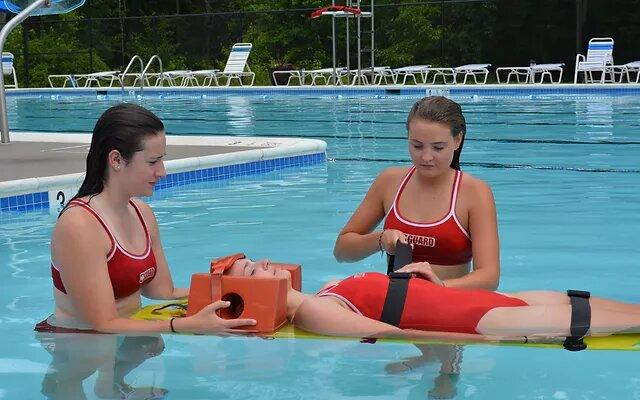
Becoming a lifeguard is not just about donning a red uniform and standing watch over swimmers. It’s a commitment to safety, preparedness, and community service. Whether you’re pursuing lifeguarding as a career or simply as a way to give back, the journey begins with a comprehensive lifeguard class. In this article, we’ll explore everything you need to know about lifeguard classes, focusing on the best certifications provided by the American Lifeguard Association (ALA).
Why Enroll in a Lifeguard Class?
Lifeguard class is designed to equip individuals with the skills necessary to prevent and respond to water-related emergencies. These courses are essential for anyone aspiring to work at pools, beaches, or aquatic facilities. The training covers a wide array of topics, including:
- Rescue Techniques: Learn how to save individuals in distress without putting yourself in danger.
- First Aid and CPR: Acquire life-saving skills to address medical emergencies on land or in the water.
- Surveillance Methods: Understand how to monitor swimmers effectively and identify potential hazards.
- Team Coordination: Collaborate with other lifeguards and emergency personnel during critical situations.
The American Lifeguard Association: A Leader in Lifeguard Training
The American Lifeguard Association (ALA) stands out as one of the premier organizations offering lifeguard certification. Renowned for its comprehensive and accessible programs, the ALA has trained thousands of lifeguards across the United States. Their classes emphasize real-world scenarios, ensuring trainees are well-prepared for any challenge they may face.
What Makes ALA’s Lifeguard Classes the Best?
-
Accredited Certification:
ALA certifications are nationally recognized and often preferred by employers. Completing their program assures aquatic facilities of your competence and readiness. -
Flexible Training Options:
The ALA understands the diverse needs of its trainees. They offer in-person classes, blended learning (online and in-person), and even customized group sessions. This flexibility makes it easier for participants to complete their training without disrupting their schedules. -
Expert Instructors:
ALA lifeguard classes are led by experienced professionals who bring a wealth of knowledge to the training. Their guidance ensures that participants not only understand the material but can apply it in real-life situations. -
Focus on Modern Techniques:
Lifeguard training evolves with advancements in medical and rescue practices. ALA courses integrate the latest methods and technologies, keeping trainees ahead of the curve.
What to Expect in an ALA Lifeguard Class
ALA lifeguard classes typically span a few days, depending on the format you choose. Here’s an outline of what you can expect:
Day 1: Orientation and Basic Skills
- Introduction to the role of a lifeguard.
- Basic water skills assessment to ensure participants meet prerequisites.
- Overview of lifeguard equipment and its use.
Day 2: Rescue Techniques and Emergency Response
- Hands-on training in water rescues, including active and passive victim retrieval.
- Practice scenarios for spinal injury management.
- Instruction on using Automated External Defibrillators (AEDs).
Day 3: First Aid and Final Assessments
- Comprehensive first aid training, including wound care and dealing with heat-related illnesses.
- CPR certification for adults, children, and infants.
- Written and practical exams to assess knowledge and skills.
Who Can Enroll in an ALA Lifeguard Class?
ALA lifeguard classes are open to anyone who meets the following criteria:
- Age: Most programs require participants to be at least 15 years old.
- Physical Fitness: Trainees should be able to swim a specified distance and retrieve objects from the water.
- Commitment: Lifeguarding requires dedication and a sense of responsibility.
The Importance of Lifeguard Certification
A lifeguard certification is more than a piece of paper; it’s a testament to your ability to protect lives. Many states and employers mandate certification as a prerequisite for lifeguarding roles. The ALA certification, in particular, is a mark of excellence that can open doors to opportunities at top-tier facilities.
Lifeguard Classes: More Than Just Training
Participating in a lifeguard class does more than teach you life-saving skills—it fosters personal growth. The experience builds confidence, improves communication, and enhances problem-solving abilities. These attributes are valuable in any career, making lifeguard training a worthwhile endeavor even for those not pursuing it professionally.
How to Choose the Right Lifeguard Class
While there are many lifeguard training programs available, the ALA stands out for its quality and credibility. Here’s how to ensure you’re selecting the right class:
- Check Accreditation: Make sure the program is recognized by local and national authorities.
- Evaluate the Curriculum: Look for courses that offer a balance of theoretical knowledge and practical experience.
- Read Reviews: Testimonials from past participants can provide insight into the program’s effectiveness.
- Consider Location and Schedule: Choose a class that fits your lifestyle and is conveniently located.
Lifeguard Classes Near You
The ALA offers lifeguard classes in various locations across the United States. Whether you’re in a bustling city or a quiet suburb, there’s likely an ALA training center near you. The association also provides resources to help you find the best course for your needs.
Lifeguarding: A Rewarding Path
Becoming a lifeguard is not just about earning a certification—it’s about making a difference. Every skill you learn in a lifeguard class equips you to save lives and create a safer environment for everyone.
Conclusion
If you’re considering a lifeguard class, the American Lifeguard Association offers an unparalleled training experience. From expert instructors to flexible learning options, ALA ensures that you’re fully prepared for the challenges and responsibilities of lifeguarding.
Start your journey today with the best lifeguard certification by ALA and take the first step toward a fulfilling role that combines skill, service, and safety.



Leave a Reply